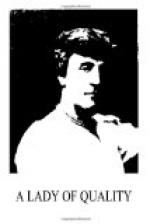“Nor would I, my lord,” she answered. “But he will not come often; I do not love him well enough.”
His marriage with the heiress who had wealth in the West Indies was broken off, or rather ’twas said had come to naught. All the town knew it, and wondered, and talked, because it had been believed at first that the young lady was much enamoured of him, and that he would soon lead her to the altar, the which his creditors had greatly rejoiced over as promising them some hope that her fortune would pay their bills of which they had been in despair. Later, however, gossip said that the heiress had not been so tender as was thought; that, indeed, she had been found to be in love with another man, and that even had she not, she had heard such stories of Sir John as promised but little nuptial happiness for any woman that took him to husband.
When my Lord Dunstanwolde brought his bride to town, and she soared at once to splendid triumph and renown, inflaming every heart, and setting every tongue at work, clamouring her praises, Sir John Oxon saw her from afar in all the scenes of brilliant fashion she frequented and reigned queen of. ’Twas from afar, it might be said, he saw her only, though he was often near her, because she bore herself as if she did not observe him, or as though he were a thing which did not exist. The first time that she deigned to address him was upon an occasion when she found herself standing so near him at an assembly that in the crowd she brushed him with her robe. His blue eyes were fixed burningly upon her, and as she brushed him he drew in a hard breath, which she hearing, turned slowly and let her own eyes fall upon his face.
“You did not marry,” she said.
“No, I did not marry,” he answered, in a low, bitter voice. “’Twas your ladyship who did that.”
She faintly, slowly smiled.
“I should not have been like to do otherwise,” she said; “’tis an honourable condition. I would advise you to enter it.”
CHAPTER XI—Wherein a noble life comes to an end
When the earl and his countess went to their house in the country, there fell to Mistress Anne a great and curious piece of good fortune. In her wildest dreams she had never dared to hope that such a thing might be.
My Lady Dunstanwolde, on her first visit home, bore her sister back with her to the manor, and there established her. She gave her a suite of rooms and a waiting woman of her own, and even provided her with a suitable wardrobe. This last she had chosen herself with a taste and fitness which only such wit as her own could have devised.
“They are not great rooms I give thee, Anne,” she said, “but quiet and small ones, which you can make home-like in such ways as I know your taste lies. My lord has aided me to choose romances for your shelves, he knowing more of books than I do. And I shall not dress thee out like a peacock with gay colours and great farthingales. They would frighten thee, poor woman, and be a burden with their weight. I have chosen such things as are not too splendid, but will suit thy pale face and shot partridge eyes.”




